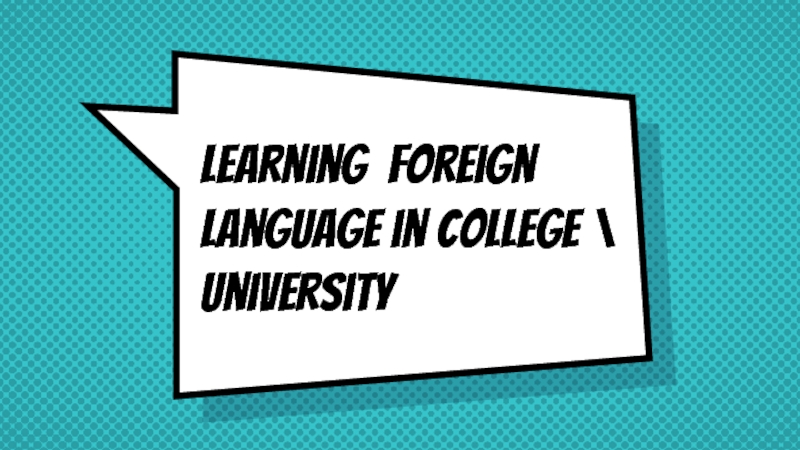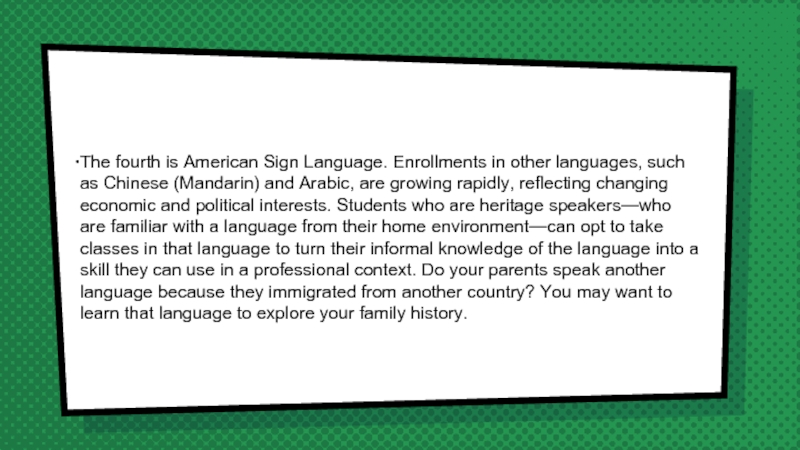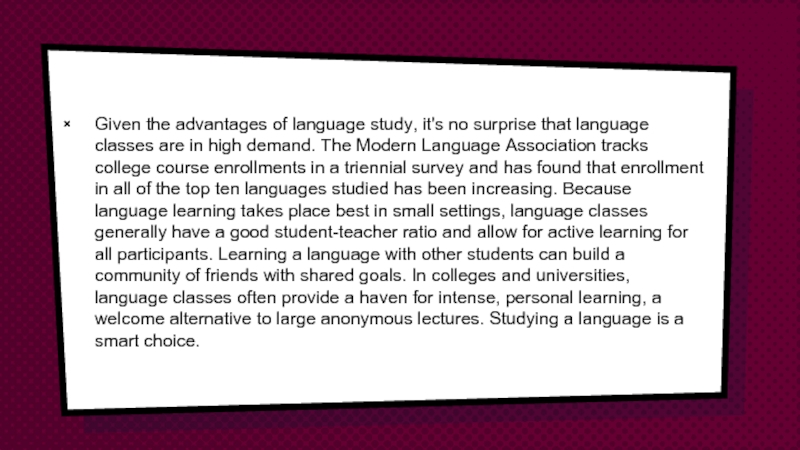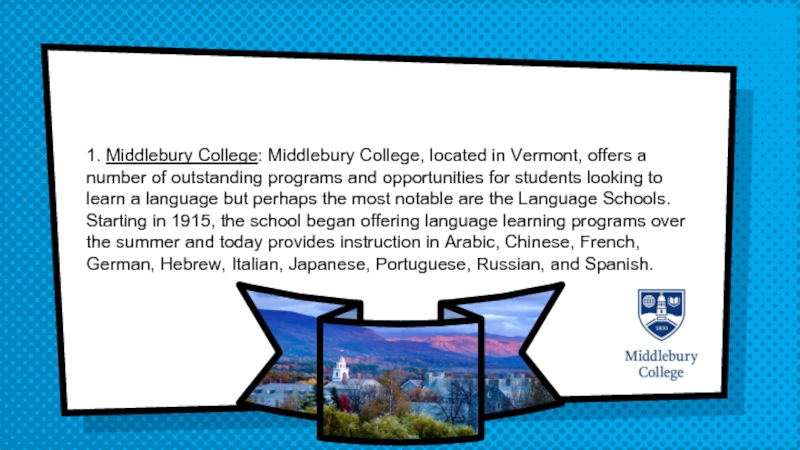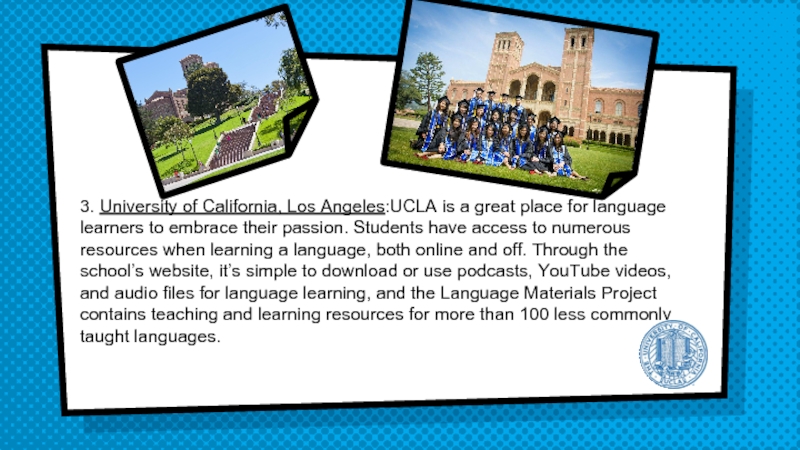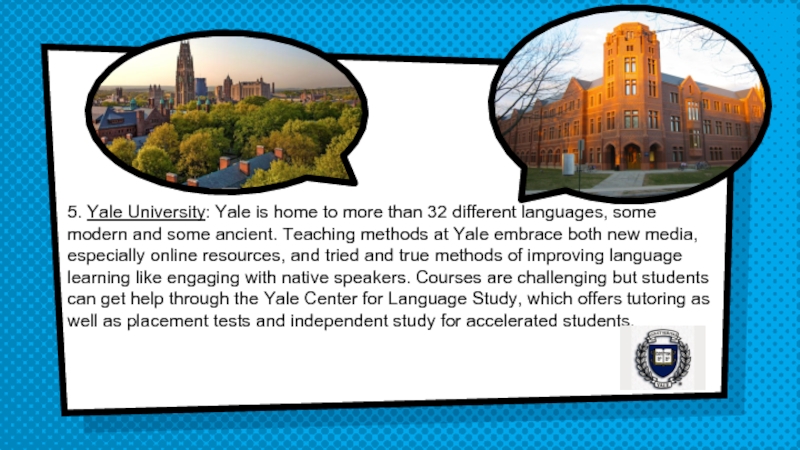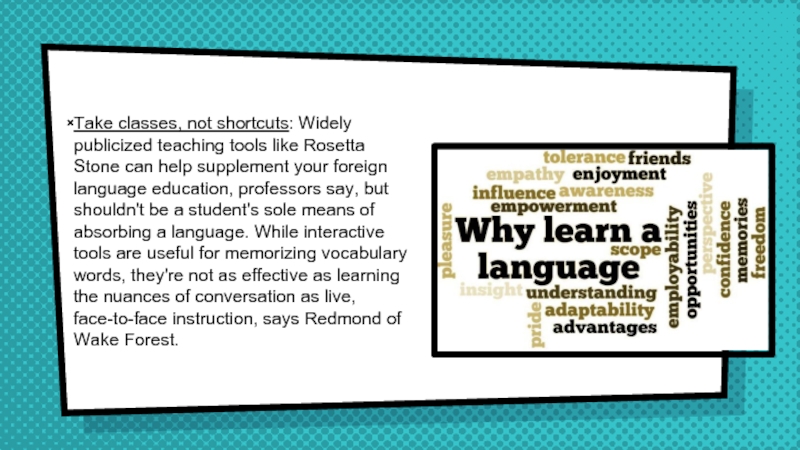- Главная
- Разное
- Дизайн
- Бизнес и предпринимательство
- Аналитика
- Образование
- Развлечения
- Красота и здоровье
- Финансы
- Государство
- Путешествия
- Спорт
- Недвижимость
- Армия
- Графика
- Культурология
- Еда и кулинария
- Лингвистика
- Английский язык
- Астрономия
- Алгебра
- Биология
- География
- Детские презентации
- Информатика
- История
- Литература
- Маркетинг
- Математика
- Медицина
- Менеджмент
- Музыка
- МХК
- Немецкий язык
- ОБЖ
- Обществознание
- Окружающий мир
- Педагогика
- Русский язык
- Технология
- Физика
- Философия
- Химия
- Шаблоны, картинки для презентаций
- Экология
- Экономика
- Юриспруденция
Learning foreign language in college, university презентация
Содержание
- 1. Learning foreign language in college, university
- 2. Hello! Created by Kobeleva Eugene
- 3. To begin with Learning a foreign language
- 4. “You live a new life for every
- 5. Learning foreign language in college Lets discuss this…
- 6. One of the best choices you can
- 7. Expanding your foreign language vocabulary
- 8. Which language should you study? Lets discuss this…
- 9. Which language should you study? Any that
- 10. The fourth is American Sign Language. Enrollments
- 11. Studying a language is a smart choice Lets discuss this…
- 12. Given the advantages of language study, it's
- 13. 5 Most Innovative Colleges for Foreign Language Study
- 14. 1. Middlebury College: Middlebury College, located in
- 15. 2. University of Wisconsin-Madison:The University of Wisconsin-Madison
- 16. 3. University of California, Los Angeles:UCLA is
- 17. 4. Stanford University: At present, Stanford offers
- 18. 5. Yale University: Yale is home to
- 19. There are some tips for choosing a foreign language
- 20. Choose an in-demand language: When conflict arises
- 21. Take classes, not shortcuts: Widely
- 22. THANKS! Any questions?
Слайд 2Hello!
Created by
Kobeleva Eugene
Petrova Kira
Alina Lysenko
Ziliya Valieva
Alexandra
Stolyarova
Bulat Hairullin
1164
Bulat Hairullin
1164
Слайд 3To begin with
Learning a foreign language opens many doors for the
learner. Even if you don't go into something that is directly related to the language(s) you learn, it can greatly benefit your career. You don't have to be a translator or a foreign language teacher to have the language make an impact on your career. For example: Learning a foreign language teaches you to appreciate other cultures more deeply than you might have otherwise. This would be a desired trait for graphic designers or an advertising manager who has to make something seem appealing to a foreign market. It makes you more of a global citizen. At the very least it will keep your brain from aging as fast as other people's brains do. It might even make your brain bigger. Learning a foreign language also helps your brain in other areas of study.
Слайд 4“You live a new life for every new language you speak
. If you know only one language , you live only once”
Czech proverb
Czech proverb
Слайд 6One of the best choices you can make when planning your
college years is the decision to learn a foreign language, whatever your major. Learning another language will open the door to another culture and enhance your career opportunities in the increasingly global economy. Having strong skills in another language may give you an edge when applying for a job. That unique ability will set you apart from other applicants and show a potential employer that you have demonstrated long-term discipline in acquiring specialized knowledge.
Studying a language will also build your overall language abilities—in English too—and strengthen your skills in interpretation and understanding. Learning the grammar of another language is an important way to get a better handle on grammar in general.
Studying a language will also build your overall language abilities—in English too—and strengthen your skills in interpretation and understanding. Learning the grammar of another language is an important way to get a better handle on grammar in general.
Слайд 7
Expanding your foreign language vocabulary helps you think about words and
their meanings in complex ways. The new language deepens your capacity to communicate and to understand the challenges of all cross-cultural relations. As countries become every more interconnected, the ability to engage in cross-cultural communication will grow ever more important.
Слайд 9Which language should you study? Any that you want. Some college
students build on the language they started in high school: you've got a head start. Other students begin a new language in college, perhaps one that was not even offered in their high school. The three most frequently studied languages in the U.S. are Spanish, French and German.
Слайд 10The fourth is American Sign Language. Enrollments in other languages, such
as Chinese (Mandarin) and Arabic, are growing rapidly, reflecting changing economic and political interests. Students who are heritage speakers—who are familiar with a language from their home environment—can opt to take classes in that language to turn their informal knowledge of the language into a skill they can use in a professional context. Do your parents speak another language because they immigrated from another country? You may want to learn that language to explore your family history.
Слайд 12Given the advantages of language study, it's no surprise that language
classes are in high demand. The Modern Language Association tracks college course enrollments in a triennial survey and has found that enrollment in all of the top ten languages studied has been increasing. Because language learning takes place best in small settings, language classes generally have a good student-teacher ratio and allow for active learning for all participants. Learning a language with other students can build a community of friends with shared goals. In colleges and universities, language classes often provide a haven for intense, personal learning, a welcome alternative to large anonymous lectures. Studying a language is a smart choice.
Слайд 141. Middlebury College: Middlebury College, located in Vermont, offers a number
of outstanding programs and opportunities for students looking to learn a language but perhaps the most notable are the Language Schools. Starting in 1915, the school began offering language learning programs over the summer and today provides instruction in Arabic, Chinese, French, German, Hebrew, Italian, Japanese, Portuguese, Russian, and Spanish.
Слайд 152. University of Wisconsin-Madison:The University of Wisconsin-Madison is a leader in
foreign language education and research and boasts some of the most prestigious departments of languages and literature in the world. Students can enroll in courses in dozens of modern and ancient languages and take part in study abroad programs to more than 100 different destinations on six continents.
Слайд 163. University of California, Los Angeles:UCLA is a great place for
language learners to embrace their passion. Students have access to numerous resources when learning a language, both online and off. Through the school’s website, it’s simple to download or use podcasts, YouTube videos, and audio files for language learning, and the Language Materials Project contains teaching and learning resources for more than 100 less commonly taught languages.
Слайд 174. Stanford University: At present, Stanford offers 14 common modern languages
and 30 less commonly taught languages like Basque, Hawaiian, Lakota, Uzbek, Vietnamese, and Swahili, though over the years 70 different languages have been taught at the school. Stanford is another school taking language learning high-tech through their Digital Language Laboratory, with which all students can expect to get some experience during their time at the school.
Слайд 185. Yale University: Yale is home to more than 32 different
languages, some modern and some ancient. Teaching methods at Yale embrace both new media, especially online resources, and tried and true methods of improving language learning like engaging with native speakers. Courses are challenging but students can get help through the Yale Center for Language Study, which offers tutoring as well as placement tests and independent study for accelerated students.
Слайд 20Choose an in-demand language: When conflict arises elsewhere in the world
and a vast American presence is required there, demand for foreign language speakers rises dramatically. The past decade of conflict in the Middle East has spurred enormous demand for Arabic speakers to work in government or contracting roles.
Go above and beyond college requirements: For students not majoring in a foreign language, there is typically a minimal requirement, if any, that they take a foreign language.
Immerse yourself: Many foreign language professors agree that immersion is the unparalleled method of absorbing another language. Students who want to learn a new language should take advantage of study abroad programs available to them during their college years to accelerate the process.
Go above and beyond college requirements: For students not majoring in a foreign language, there is typically a minimal requirement, if any, that they take a foreign language.
Immerse yourself: Many foreign language professors agree that immersion is the unparalleled method of absorbing another language. Students who want to learn a new language should take advantage of study abroad programs available to them during their college years to accelerate the process.
Слайд 21
Take classes, not shortcuts: Widely publicized teaching tools like Rosetta Stone
can help supplement your foreign language education, professors say, but shouldn't be a student's sole means of absorbing a language. While interactive tools are useful for memorizing vocabulary words, they're not as effective as learning the nuances of conversation as live, face-to-face instruction, says Redmond of Wake Forest.
